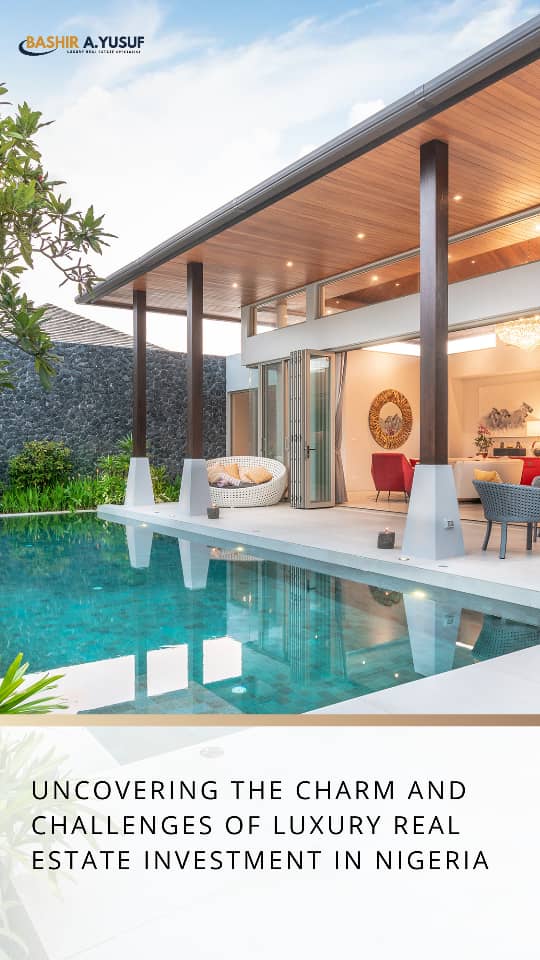By Bashir Ademola Yusuf
Investing in luxury real estate in Nigeria can be a captivating venture, offering a range of benefits and drawbacks. The Nigerian luxury real estate market is experiencing a transformative phase, witnessing unprecedented growth and development driven by economic prosperity, changing consumer preferences, and a global outlook. The country’s diverse economic base, encompassing industries like oil and gas, telecommunications, and more, has shown remarkable resilience in the face of global economic challenges.
However, the market is not impervious to market shifts, and investors must stay vigilant and adaptable to navigate these undulating market currents. Making well-informed decisions in this realm demands meticulous market analysis, a thorough understanding of local intricacies, and prudent advice from seasoned real estate professionals. In the following, I will try to analyze the two sides of luxury real estate investment in Nigeria.
Pros of Investing in Luxury Real Estate in Nigeria
1. Potential for High Returns: Luxury real estate in prime Nigerian cities, such as Lagos and Abuja, has a proven track record of delivering remarkable returns on investment. Over time, these opulent properties have showcased substantial appreciation rates, significantly bolstering investors’ capital gains. The buoyancy of the luxury market often outperforms other real estate sectors, making it an attractive proposition for those seeking substantial returns on their investment.
2. Resilience Against Market Fluctuations: The resilience of luxury real estate in Nigeria is a testimony to its ability to confront market downturns with relative stability. In the face of economic turbulence, the demand for upscale properties remains steadfast, especially among high-net-worth individuals and expatriates. This unwavering demand provides a shield against market uncertainties, ensuring that the luxury market retains its stability and allure even during challenging economic climates.
3. Prestige and Exclusivity: Beyond financial gains, luxury properties symbolize prestige, exclusivity, and a coveted lifestyle. Owning or investing in such properties is more than acquiring a tangible asset; it signifies an embodiment of status and refined living. In Nigeria’s evolving real estate landscape, the appeal of luxury properties transcends mere ownership, catering to a select clientele seeking a lifestyle synonymous with opulence.
4. Opportunities for Diversification: Luxury real estate offers an avenue for smart investors to diversify their portfolios, mitigating risks while maintaining tangible, secure assets. Amidst inflationary pressures and currency fluctuations, luxury properties in Nigeria stand as a stable, appreciating asset that complements a well-diversified investment strategy.
5. Rental Yields and Income Potential: The allure of luxury properties extends to the realm of rental yields, often commanding higher returns due to their exclusivity and demand. Major Nigerian cities like Abuja and Lagos are hubs for expatriates, diplomats, and corporate executives in need of upscale accommodations. Consequently, the demand for premium rental properties in prime locations fuels lucrative rental yields, promising consistent income streams for discerning investors.
Cons of Investing in Luxury Real Estate in Nigeria
Investing in luxury real estate in Nigeria is a captivating venture that opens doors to a world of possibilities, yet it comes with its set of considerations and challenges. Delving deeper into the realm of potential downsides will offer a more holistic view for investors navigating this high-end market.
1. Market Volatility: While luxury real estate demonstrates resilience, it’s not impervious to market shifts. Economic fluctuations, regulatory changes, and geopolitical dynamics can sway demand and pricing, impacting the stability of investments. An investor must stay vigilant and adaptable to navigate these undulating market currents.
2. Entry Barriers and Accessibility: The opulence of luxury properties in Nigeria demands substantial upfront capital, blocking many investors. Access to this elite market segment is limited due to the substantial financial investment required, restricting the pool of potential investors.
3. Market Saturation Challenges: Certain Nigerian locations may witness saturation in the luxury real estate segment, leading to potential price stagnation or even a decline. Oversupply in specific areas could challenge investment returns, necessitating a careful evaluation of market dynamics before committing to such ventures.
4. Higher Maintenance Costs: The grandeur of luxury properties demands meticulous upkeep, which often translates to higher maintenance costs. Maintaining the opulence and charm of these estates requires ongoing substantial expenses, impacting the overall return on investment.
5. Economic and Political Risks: Investing in luxury real estate in Nigeria exposes investors to economic and political risks. Currency devaluation, changes in government policies, and geopolitical uncertainties could significantly affect the value and stability of these investments, demanding a nuanced approach to risk management.
Conclusion
Investing in luxury real estate in Nigeria presents a dynamic blend of charming opportunities and degree of challenges. While the prospects of high returns, prestige, and diversification beckon, investors must balance these against the realities of market volatility, high entry costs, oversupply risks, maintenance expenses, and economic uncertainties. Making well-informed decisions in this realm demands meticulous market analysis, a thorough understanding of local intricacies, and prudent advice from seasoned real estate professionals. A comprehensive approach to navigating the luxury real estate landscape in Nigeria will empower investors to make sound and calculated investment decisions aligned with their long-term objectives.
Mallam Bashir Ademola Yusuf is the CEO and founder of Estate Code Nigeria Ltd, a highly regarded organization in the Nigeria Real Estate Industry. He specializes in luxury homes and new developments. Bashir is a trained negotiator from the University of Michigan, United States of America, and has profound knowledge of the market, coupled with his commitment to excellence, positioning him as a trusted advisor for investors and home buyers seeking unparalleled insights and opportunities in the luxury real estate sector.
